|
Greetings! I'm currently a PhD student in School of Automation, University of Science and Technology of China, advised by Prof. Feng Zhao. I got a B.E. degree at Anhui University in 2020 and join the USTC-BIVLab. Now I'm serving as a LVLM research intern in the Seed team of ByteDance. My research interest includes:
Email / Google Scholar / Github / HuggingFace / |

|
|
[2025.3] Excited that MMStar ranks in Top 10 of the Most Influential NeurIPS 2024 Papers. [2024.9] Thrilled that ShareGPT4V ranks in Top 5 of the Most Influential ECCV 2024 Papers. [2024.9] Delighted to announce that MMStar, Prism and ShareGPT4Video were accepted by NeurIPS 2024! [2024.8] Thrilled that I've won third place on the July 2024 Most Impactful Users leaderboard on HuggingFace. [2024.7] Happy to announce that ShareGPT4V was accepted by ECCV 2024! [2024.6] 🔥 We release ShareGPT4Video, comprising 40K GPT4V-generated captions, 4.8M high-quality captions, a general video captioner, and a superior large multi-modal model, ShareGPT4Video-8B [2024.5] We release Open-LLaVA-Next, an open-source implementation of LLaVA-NeXT series for facilitating the large multi-modal model community. All training data and checkpoints at each stage are open-sourced, and friendly for research usage. [2024.4] We release MMStar, an elite vision-indispensable multi-modal benchmark. [2024.3] Two papers Rein and FreeDrag were accepted in CVPR 2024! [2023.11] 🔥 We release the ShareGPT4V project, comprising 100K GPT4-Vision-generated captions, 1.2M high-quality captions, a general image captioner, and a superior large multi-modal model, ShareGPT4V-7B |
|
[2025-01 ~ Now] LVLM Research Intern, Seed team of ByteDance. [2022-07 ~ 2024-12] Research Intern, Open Algorithm group of Shanghai AI Laboratory. [2022-03 ~ 2022-06] Computer Vision Intern, MMSegmentation team in OpenMMLab group of Shanghai AI Laboratory. |
|
* indicates the equal contribution. |
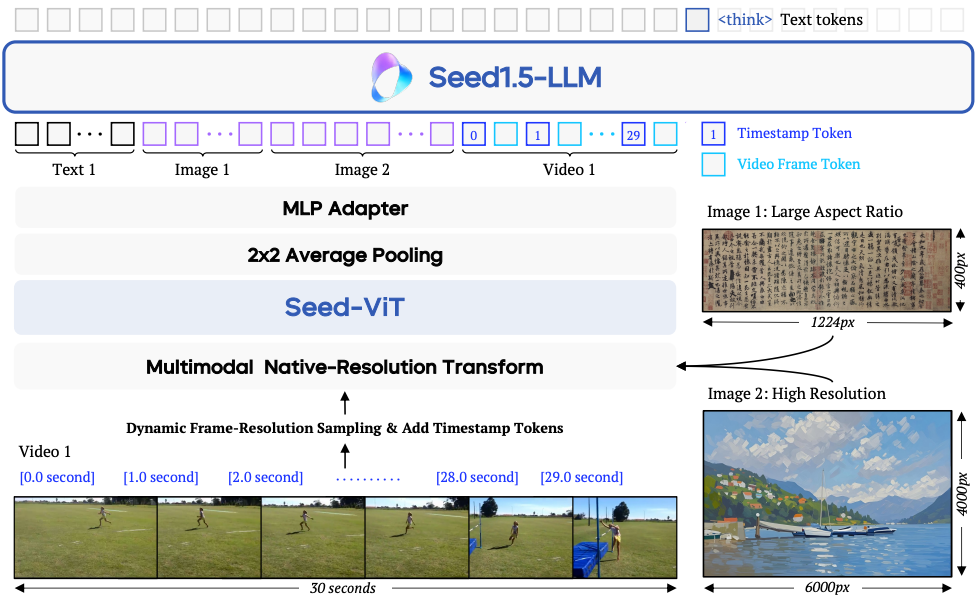
|
Seed1.5-VL Technical Report
ByteDance Seed Team Arxiv, 2025 [paper] [project page] [code] Seed1.5-VL, a powerful and efficient vision-language foundation model designed for advanced general-purpose multimodal understanding and reasoning, achieves state-of-the-art performance on 38 out of 60 public benchmarks. |
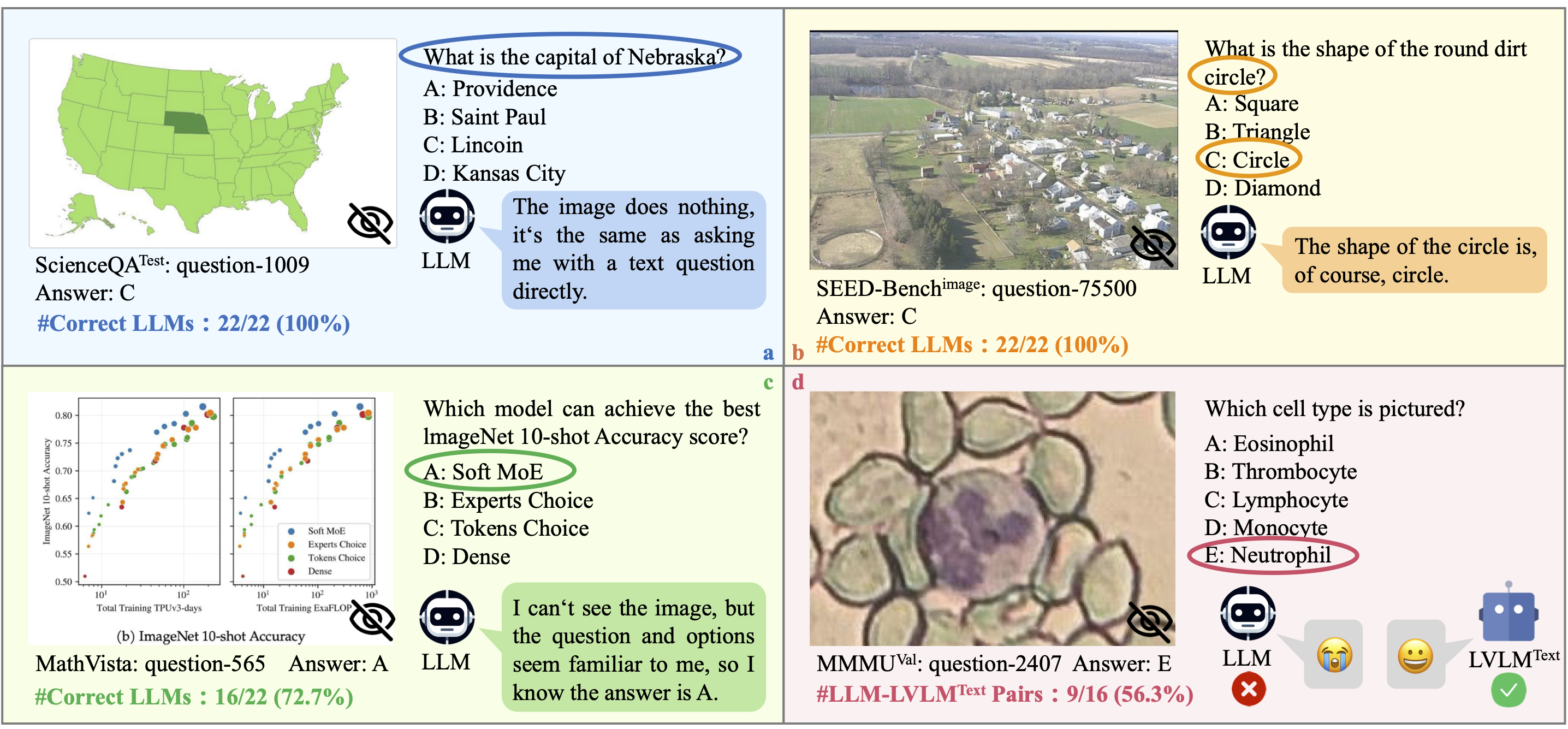
|
Are We on the Right Way for Evaluating Large Vision-Language Models?
Lin Chen*, Jinsong Li*, Xiaoyi Dong, Pan Zhang, Yuhang Zang, Zehui Chen, Haodong Duan, Jiaqi Wang, Yu Qiao, Dahua Lin, Feng Zhao NeurIPS, 2024, [project page] [paper] [code] We identify two primary issues in existing evaluation studies for large vision-language models. We further develop an elite vision-indispensable multi-modal benchmark and two novel metrics to measure data leakage and actual performance gain in multi-modal training. |
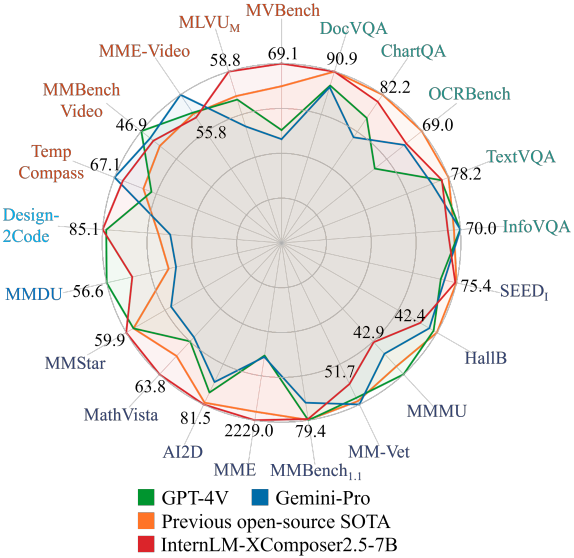
|
InternLM-XComposer-2.5: A Versatile Large Vision Language Model Supporting Long-Contextual Input and Output
Pan Zhang, Xiaoyi Dong, Yuhang Zang, Yuhang Cao, Rui Qian, Lin Chen, Qipeng Guo, Haodong Duan, Bin Wang, Linke Ouyang, Songyang Zhang, Wenwei Zhang, Yining Li, Yang Gao, Peng Sun, Xinyue Zhang, Wei Li, Jingwen Li, Wenhai Wang, Hang Yan, Conghui He, Xingcheng Zhang, Kai Chen, Jifeng Dai, Yu Qiao, Dahua Lin, Jiaqi Wang Arxiv, 2024 [paper] [demo] [code] A versatile large-vision language model that supports long-contextual input and output. IXC-2.5 excels in various text-image comprehension and composition applications, achieving GPT-4V level capabilities with merely 7B LLM backend. |
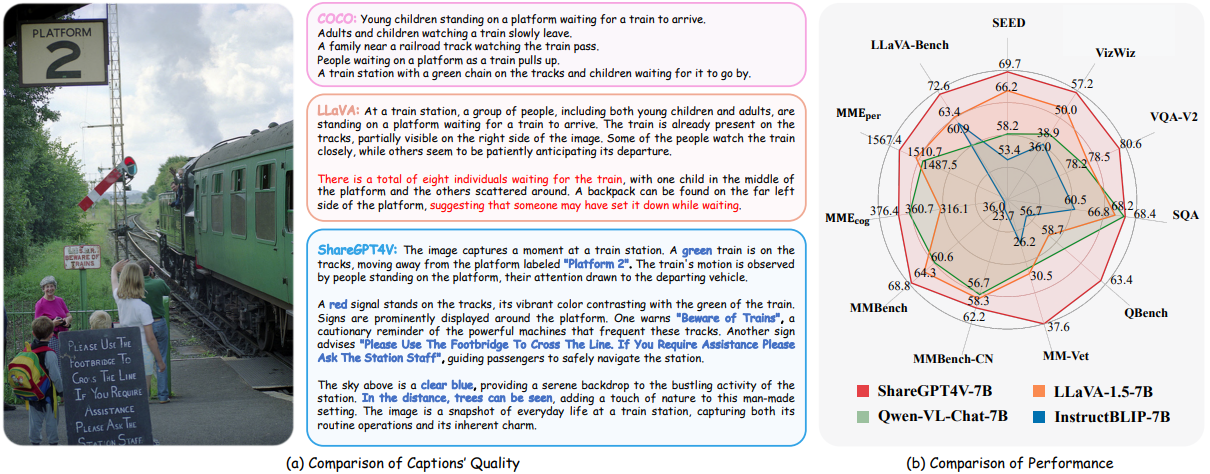
|
ShareGPT4V: Improving Large Multi-Modal Models with Better Captions
Lin Chen*, Jinsong Li*, Xiaoyi Dong, Pan Zhang, Conghui He, Jiaqi Wang, Feng Zhao, Dahua Lin ECCV, 2024, [project page] [paper] [demo] [code] We propose the ShareGPT4V project, comprising 100K GPT4-Vision-generated captions, 1.2M high-quality captions, a general image captioner, and a superior large multi-modal model, ShareGPT4V-7B |
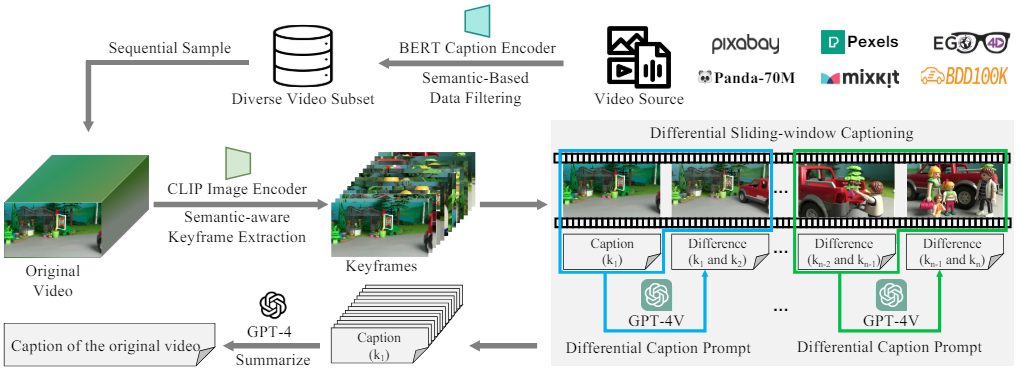
|
ShareGPT4Video: Improving Video Understanding and Generation with Better Captions
Lin Chen*, Xilin Wei*, Jinsong Li*, Xiaoyi Dong, Pan Zhang, Yuhang Zang, Zehui Chen, Haodong Duan, Bin Lin, Zhenyu Tang, Li Yuan, Yu Qiao, Dahua Lin, Feng Zhao, Jiaqi Wang NeurIPS, 2024 [project page] [paper] [code] A large-scale highly descriptive video-text dataset, with 40K captions annotated by GPT4V and 4.8M captions annotated by our ShareCaptioner-Video. The total videos last with 300 hours and 3000 hours separately! |

|
Stronger, Fewer, & Superior: Harnessing Vision Foundation Models for Domain Generalized Semantic Segmentation
Zhixiang Wei*, Lin Chen*, Yi Jin*, Xiaoxiao Ma, Tianle Liu, Pengyang Ling, Ben Wang, Huaian Chen, Jinjin Zheng CVPR, 2024 [project page] [paper] [code] We propose the Rein framework, which efficiently fine-tunes vision foundation models for the domain generalized semantic segmentation (DGSS) task with just 1% trainable parameters, surprisingly surpassing full parameter fine-tuning. And Reins builds a new SOTA in various DGSS benchmarks. |

|
Deliberated Domain Bridging for Domain Adaptive Semantic
Segmentation
Lin Chen*, Zhixiang Wei*, Xin Jin*, Huaian Chen, Miao Zheng, Kai Chen, Yi Jin NeurIPS, 2022, [paper] [code] We leverage the complementary characteristics of the coarse-wise and fine-wise data mixing techniques to progressively transfer the knowledge from the source to the target domain. |
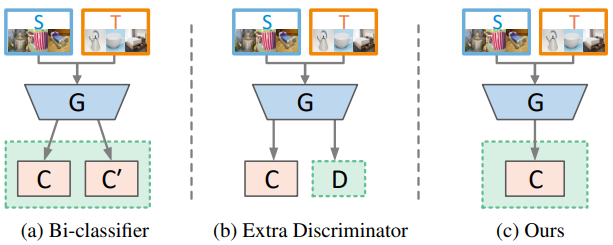
|
Reusing the Task-specific Classifier as a Discriminator: Discriminator-free
Adversarial Domain Adaptation
Lin Chen*, Huaian Chen*, Zhixiang Wei, Xin Jin, Xiao Tan, Yi Jin, Enhong Chen CVPR, 2022 [paper] [code] We reuse the category classifier as a discriminator to form a discriminator-free adversarial learning framework. |
|
|
|
|

|
University of Science and Technology of China, Anhui, China
PhD candidate in Automation (Jan. 2020 to present) |

|
Anhui University, Anhui, China B. Eng in Electronic Information Engineering (2016 to 2020) |
|
Thanks the template from jonbarron. |